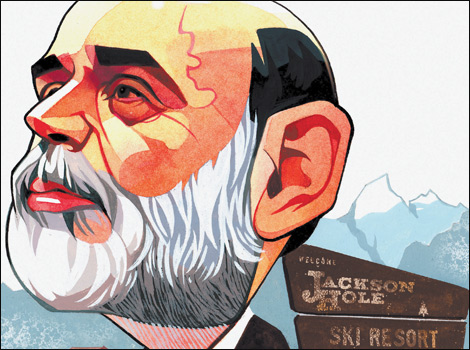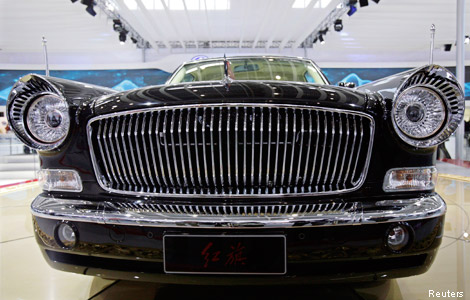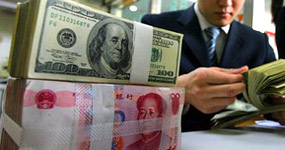
对上周五在杰克逊湖旅店(Jackson Lake Lodge)的游客来说,Explorers大厅里那一群书呆子正在开的会,跟一个吸尘器销售会议没什么两样,也没什么值得关心的。于是,他们越过宁静的湖水,眺望怀俄明州巍峨的特顿山脉。
然而,在这个房间里,一位举止温和的前学者——美联储(Fed)主席本•伯南克(Ben Bernanke)——正发表将影响所有人生活的演讲。金融市场正密切关注他在Jackson Hole 年度会议上说出的每句话。
这位全球最重要的央行行长现在面临的风险,高于此次金融危机最黑暗时期以来的任何时刻。美国经济复苏形势不稳;第二季度经济增速下修至1.6%。这种增速不仅不足以降低失业率,失业率甚至可能会再度上升。
正如伯南克在上周五似乎表明的那样,他可能不得不很快采取重大举措,率领联邦公开市场委员会(FOMC)的同事——其中一些人并不情愿——启动新一轮定量宽松操作。这将意味着,美联储将通过购买数以十亿美元计的资产向经济注入资金,以提振经济活动。
这将是对他的经济判断、决心以及共识型领导风格的考验。2006年至2009年与伯南克共事的美联储前理事兰达尔•克鲁斯内尔(Randall Kroszner)表示:“他是一位非常温和的领袖,但他知道如何领导。”克鲁斯内尔现任芝加哥大学布斯商学院(Chicago Booth business school)教授。
与经常展示权威作风的前任艾伦•格林斯潘(Alan Greenspan)形成对比的是,伯南克喜欢在联邦公开市场委员会构建共识。当委员会阐明其政策看法时,格林斯潘会先讲话(由此主导整个过程),而伯南克会等到最后,总结所有人的发言,然后提出自己的观点。
这令人担心,如果像现在这样,各方对采取行动的必要性存在分歧,那么对于共识的追求可能让美联储陷入瘫痪。然而,出席联邦公开市场委员会会议的官员表示,这就误解了伯南克的性格和方法。他受到同事的尊敬,即便存在严重分歧,委员会也很可能听从他的领导。
生于1953年8月的伯南克在南卡罗莱纳州的狄龙长大,当时那里的人口只有数千人,现在也是如此。他似乎总是注定会成名,尽管最初他是一位学者:他跳过一年级,大学入学考试成绩在南卡罗莱纳州名列第一,然后赴哈佛大学(Harvard)和麻省理工学院(MIT)深造。
凭借对大萧条(Great Depression)和通胀目标机制的研究,他似乎出奇的适合危机央行行长这一角色。然而,尽管他的风格和履历都令人敬畏,但他受到的批评几乎超过其他任何一位央行行长,其中一些批评是公平的(如针对他未能判断出2005年和2006年房地产泡沫),但另一些则不那么公平(如针对他在2008年银行业纾困中的角色)。
结果是,尽管伯南克颇有成就,但他的名誉却有点脆弱。全球对央行行长们的关注如此密切,以至于如果他现在被视为失败,他将面临如潮般的批评。
纽约大学教授、曾长期与伯南克共同著书的马克•格特勒(Mark Gertler)第一次遇到伯南克是在1979年,当时伯南克刚获得博士学位。“他被视为市场上最优秀的学生之一,人们对他已是久闻大名,”他表示,“我认为他是一位富于直觉的思想家。他非常敏捷,他不是那种会写下很多方程式的人,尽管他能够做到这点。”
无疑,在同事的眼里,他的记录和举止有助于为他增色。2002年和2003年,他曾就美国如何避免通缩以及日本应如何摆脱通缩性低迷发表演讲。美联储前理事、Macroeconomic Advisors现任副董事长劳伦斯•梅尔(Laurence Meyer)表示,伯南克的2002年论文是美联储的一张路线图。
伯南克的许多同事谈到,在2008年秋季危机最严重时期(当时银行体系似乎有完全垮塌的可能),他表现得相当平静,但他们表示,这并非战斗中的欢乐或无趣人的冷淡,而是伯南克认为,保持平静是最佳策略。一位曾在危机之初与伯南克共同参加会议的人还记得伯南克的话:“我们必须选择保持平静。”
伯南克风格的另一个特点是坦率。这点对市场造成的迷惑,几乎与格林斯潘更为晦涩的措辞相当。当伯南克7月告诉美国国会,经济前景存在“不同寻常的不确定性”时,市场对这个短语详加解读。美联储认为经济在崩溃吗?这是有关政策的一个含蓄信号吗?其实,伯南克讲话的字面意思,很可能就是他想要表达的意思。
作为乔治•W•布什(George W. Bush)任命的美联储主席,伯南克总会让奥巴马政府有些疑虑,这曾让人怀疑他是否会连任。他看上去不喜欢在国会作证,在面对敌意问题时经常显示出紧张。
然而,重要的批评在于,自2009年中期以来,他没有进一步实施宽松政策,而是选择忍受黯淡的经济前景:没有新的萧条迹象,但失业率将多年保持高位。普林斯顿大学经济学家保罗•克鲁格曼(Paul Krugman)将美联储目前的政策称为“严重不足”和“逻辑荒谬”。他辩称,美联储早就应该购买更多资产。
伯南克的判断(迄今仍未改变)是,美联储如果将自身的资产负债表规模从2万亿美元扩大至4万亿或6万亿美元,其成本和风险将大于不确定的益处。他将不得不判断这种盘算是否或何时不再成立。格特勒表示:“我所了解的伯南克天性大胆积极。他绝不希望成为让经济垮掉的美联储主席。”
许多事情不在他的掌控之中——尤其是已经扼杀再次出台刺激政策可能性的政界——但是,即使他在金融危机期间挽救了美国经济,如果美国经济随后遭遇“失去的十年”,那么他也不会被铭记为一位伟大的美联储主席。
译者/何黎
http://www.ftchinese.com/story/001034395

It might as well have been a vacuum cleaner sales convention for all the tourists at the Jackson Lake Lodge appeared to care on Friday about the bookish group of people in the Explorers room. They looked instead across the stillness of the lake to the peaks of the Teton Range in Wyoming.
Yet inside the room a mild-mannered ex-academic – chairman Ben Bernanke of the Federal Reserve – was giving a speech that will affect all of their lives. Financial markets were hanging on his every word delivered at the annual Jackson Hole symposium.
The stakes for the world’s most important central banker are higher now than at any time since the depths of the financial crisis. The US economic recovery is faltering; growth in the second quarter was revised down to 1.6 per cent. Not only is that not fast enough to bring down unemployment, it may even start to rise again.
As he appeared to signal on Friday, Mr Bernanke may soon have to take the momentous step of leading his colleagues on the Federal Open Market Committee – some of them unwillingly – into a new round of quantitative easing. That would mean pumping cash into the economy by buying billions of dollars of assets in an effort to boost activity.
It will be a test of his economic judgment, of his fortitude, and of his consensual leadership style. “He’s a very gentle leader but someone who knows how to lead,” said Randall Kroszner, a Fed governor with Mr Bernanke from 2006 to 2009, and now a professor at the Chicago Booth business school.
In contrast to Alan Greenspan, his often autocratic predecessor, Mr Bernanke likes to build consensus on the FOMC. Whereas Mr Greenspan would go first when the committee stated its views on policy – and so dominate the process – Mr Bernanke waits until the end, sums up what everyone said, and then gives his own view.
That has led to fears that the Fed could be paralysed by a search for consensus if, as it is today, the committee is divided about the need for action. But people who attend the FOMC say that is to misunderstand Mr Bernanke’s character and methods. Mr Bernanke has his colleagues’ respect and, even if they disagree strongly, the FOMC is likely to follow him wherever he wants them to go.
Born in August 1953, Mr Bernanke grew up in Dillon, South Carolina, which had a population then, as now, of a few thousand people. He always seemed destined for stardom, albeit at first as an academic: he skipped first grade, topped his state of South Carolina in college entrance exams and then went on to Harvard and MIT.
With his research on the Great Depression and inflation targeting, he seems almost freakishly suited to the role of crisis central banker. Yet despite his august style and CV he has endured more criticism than almost any other central banker, some of it fair for his failure to diagnose the housing bubble in 2005 and 2006, and some of it less so for his role in the banking bail-outs of 2008.
The result is that, despite all Mr Bernanke’s achievements, his reputation is fragile. So closely does the world watch its central bankers that, if he is seen to fail now, he will face a tide of ranting commentary.
Mark Gertler, a long-time co-author with Mr Bernanke and now a professor at New York University, first met him when he was a newly-minted PhD in 1979. “He was considered one of the top students on the market – people already knew him by reputation,” he says. “I would describe him as an intuitive thinker. He’s very quick and he’s not someone to write down a lot of equations, although he’s capable of doing it.”
Certainly his record and demeanour stand him in good stead in the eyes of his colleagues. In 2002 and 2003 he gave speeches on how to avoid deflation in the US and about what Japan should do to escape its deflationary slump. Laurence Meyer, a former Fed governor and now vice-chairman of Macroeconomic Advisors, says that the 2002 paper has been a roadmap for the Fed.
Many colleagues remark on how calm he was during the worst of autumn 2008 – when total collapse of the banking system seemed possible – but say it was not joy in the battle or the phlegmatic calm of an unimaginative man. Rather, Mr Bernanke decided that being calm would work best. One person who was in a meeting with him early in the crisis remembers his saying: “We have to choose to be calm.”
Another hallmark of the Bernanke style is straightforwardness – something that confuses the market almost as much as the more cryptic remarks of Mr Greenspan. When Mr Bernanke told Congress in July that the economic outlook was “unusually uncertain” markets pounced on the phrase. Did the Fed think the economy was collapsing? Was it a coded signal about policy? The literal meaning of his words was probably all that Mr Bernanke intended.
As an appointee of George W. Bush, Mr Bernanke was always going to be viewed with some suspicion by the Obama White House, which helped to fuel the speculation about whether he would be reappointed to a second term. He does not seem to enjoy his visits to testify in Congress, often tensing visibly in the face of hostile questions.
The criticism that matters, though, is that by not easing policy any further since mid-2009 he has chosen to tolerate a grim economic outlook, in which there is no new depression but unemployment remains high for years. The Princeton economist Paul Krugman has called the Fed’s current policy “grossly inadequate” and “logically bizarre” . He argues that the Fed should already be buying more assets.
The judgment that he has made, and not changed so far, is that the uncertain benefits of boosting the Fed’s balance sheet from $2,000bn to $4,000bn or $6,000bn are outweighed by the costs and risks of doing so. He will have to judge if and when that is no longer the case. “Everything I know about Bernanke is that his instinct is to be aggressive. There’s no way on Earth he wants to be the Fed chairman who lets the economy deteriorate,” says Mr Gertler.
Much lies outside his control – not least politics that have stifled the chance of another stimulus – but he will not be remembered as a great chairman if he rescues the economy from a financial crisis, only for it to suffer a lost decade.








